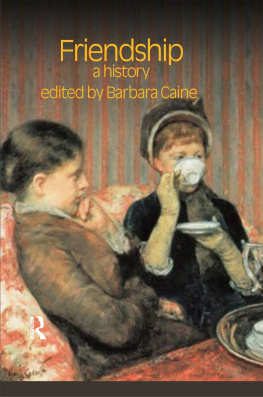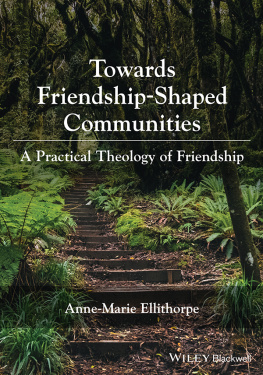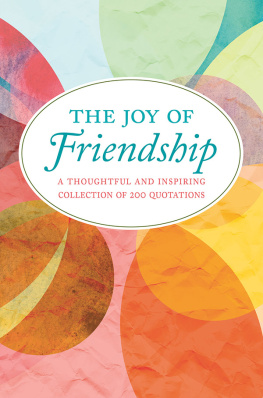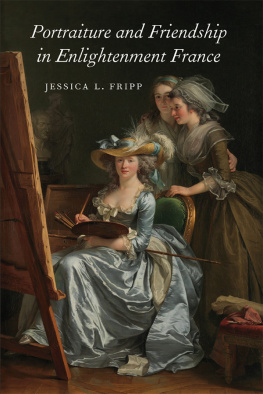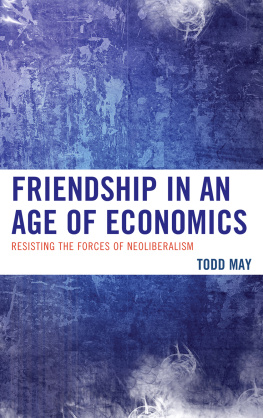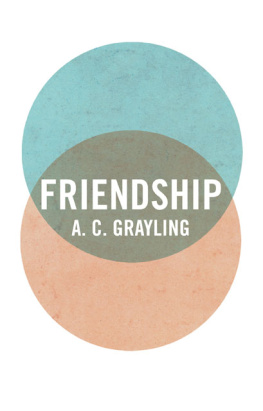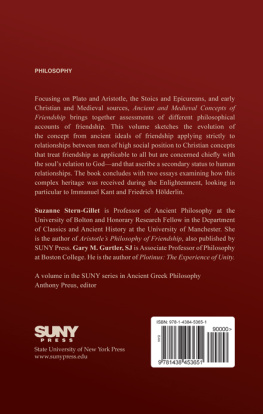
Friendship
Critical Histories of Subjectivity and Culture
Editors: Barbara Caine, Monash University, and Glenda Sluga, University of Sydney
This series highlights the relationship between understandings of subjectivity, identity, culture and broader historical change. It seeks to foster historical studies which situate subjectivity in social, political and cultural contexts. Some of these studies interrogate and elucidate broad historical themes and periods, and cultural and social change, by analysing discourses about personal identity and subjectivity, others focus on lifestories and representations of the self.
The series has no chronological or geographical limitations, although preference will be given to comparative work and to studies which approach their questions in a broad transnational framework. As the emphasis on subjectivity suggests, questions about gender and sexuality, and national or ethnic identity are central issues in all volumes. Detailed studies also offer a sense of the broad context of historical change: for example, questions of national identity are discussed within transnational and imperial frameworks.
The emphasis on critical histories is indicative of our interest in studies with a theoretical and historiographical edge, especially those that open up new historical approaches and problematize standard ways of dealing with subjectivity and culture.
Published:
Histories of Sexuality
Antiquity to Sexual Revolution
Stephen Garton
Memory and Utopia
The Primacy of Intersubjectivity
Luisa Passerini
Forthcoming:
Remembering Dispossession
Aboriginals, Colonization and History
Maria Nugent
Friendship
A History
Edited by
Barbara Caine

First published 2009 by Equinox, an imprint of Acumen
Published 2014 by Routledge
2 Park Square, Milton Park, Abingdon, Oxon OX14 4RN
711 Third Avenue, New York, NY 10017, USA
Routledge is an imprint of the Taylor & Francis Group, an informa business
Barbara Caine and contributors 2009
All rights reserved. No part of this book may be reprinted or reproduced or utilised in any form or by any electronic, mechanical, or other means, now known or hereafter invented, including photocopying and recording, or in any information storage or retrieval system, without permission in writing from the publishers.
Notices
Practitioners and researchers must always rely on their own experience and knowledge in evaluating and using any information, methods, compounds, or experiments described herein. In using such information or methods they should be mindful of their own safety and the safety of others, including parties for whom they have a professional responsibility.
To the fullest extent of the law, neither the Publisher nor the authors, contributors, or editors, assume any liability for any injury and/or damage to persons or property as a matter of products liability, negligence or otherwise, or from any use or operation of any methods, products, instructions, or ideas contained in the material herein.
British Library Cataloguing-in-Publication Data
A catalogue record for this book is available from the British Library.
ISBN-13 978 184553 196 6 (hardback)
978 184553 197 3 (paperback)
Library of Congress Cataloging-in-Publication Data
Friendship : a history / edited by Barbara Caine.
p. cm. (Critical histories of subjectivity and culture)
Includes bibliographical references and index.
ISBN 978-1-84553-196-6 (hb) ISBN 978-1-84553-197-3 (pbk.) 1. FriendshipHistory. I. Caine, Barbara.
BF575.F66F725 2008
302.3409dc22
2008007702
Typeset by S.J.I. Services, New Delhi
CONTENTS
Dirk Baltzly and Nick Eliopoulos
Constant J. Mews
Constant J. Mews and Neville Chiavaroli
Carolyn James and Bill Kent
David Garrioch
Barbara Caine
Marc Brodie and Barbara Caine
Mark Peel
Mark Peel, with Liz Reed and James Walter
PREFACE
Friendship: A History is the first book that has attempted to consider friendship across such a very long period of time from Classical Athens to the current day one far too long for any individual even to hope to cover. And it is of course a collaborative work that has been devised, developed and written by a group of scholars with different disciplinary backgrounds and different areas of specialty. The book necessarily reflects both our expertise and our limitations. It is clearly a history of friendship in the West and we look forward to the appearance of other studies that explore the meaning, the nature and the changing pattern of friendships in other parts of the world.
The writing process itself was an experimental venture involving a team of people working closely together and in ways that were new to us all. We wanted the book to be a multi-authored work that could be read as a continuous history rather than as a series of discrete essays. Several of us have written jointly with colleagues in the past but never with a group of twelve! We planned and worked on the book quite intensively over a couple of years, designing it in the course of a number of workshops, recording some of our general discussions and talking through the themes very thoroughly before beginning to write. The overall structure reflects our different areas of expertise as well as our sense of how the history of friendship has developed; the team was made up of two people who specialize in classical Greek philosophy, two medievalists, two Renaissance historians, one specialist in the eighteenth century, two nineteenth-century historians and three people who work on the twentieth century. Responsibility for each chapter was given to a particular individual or small group but each chapter was intensively discussed in a couple of workshops as we sought to ensure the continuity in our thematic approach and to bring together the different specific areas and discussions into a coherent whole.
We are extremely grateful to the Arts Faculty at Monash University for the initial grant that made this project possible. We would like to thank Carly Millar for invaluable assistance with the bibliography and for help in setting up the project in its early stages. We thank Sarah Pinto for compiling the final bibliography and for her assistance in completing the manuscript.
INTRODUCTION
No one can underestimate the importance attributed to friendship in contemporary society. It is seen as an indication of social integration and a requirement of both physical and mental health as well as a source of happiness. It is a relationship subject to constant representation, discussion and analysis in newspapers and magazines and in contemporary film and television programs, as the popular series simply called Friends attests. As is so often the case, the current popular interest in friendship has an academic counterpart in the immense amount of research which has been done recently into the meaning and nature of friendship in different societies, and in earlier stages of our own. Scholars working in many different disciplines including sociology, psychology and anthropology as well as literature, history and philosophy have all turned their attention to questions about friendship. Most of this research has sought to explore the many different ways in which friendship was described, understood, organized and experienced in different societies and cultures, and to analyse its meaning, role and importance in a range of different contemporary societies and cultures and in the past.
Next page
